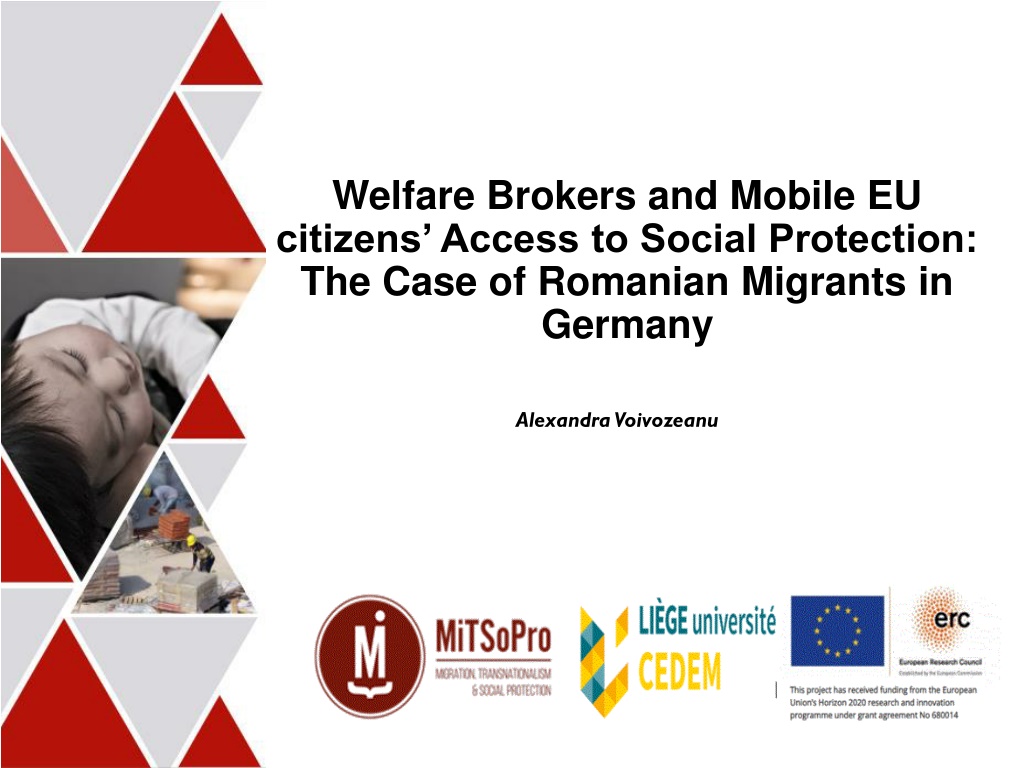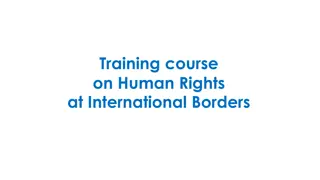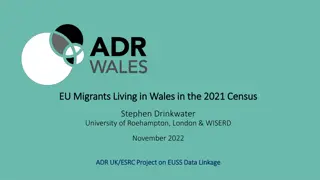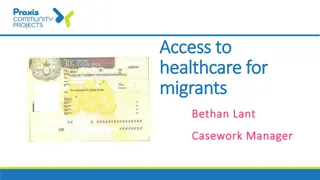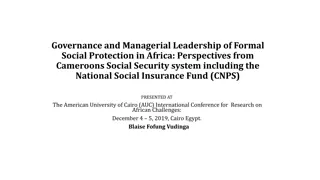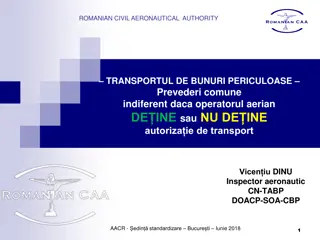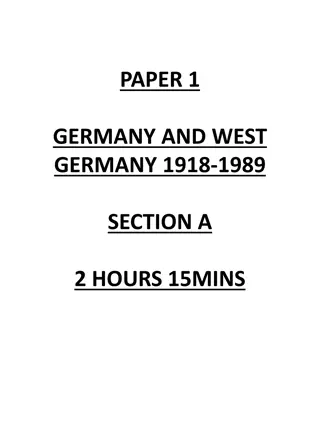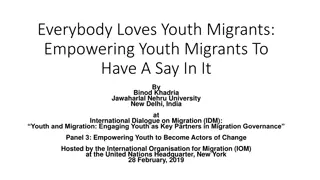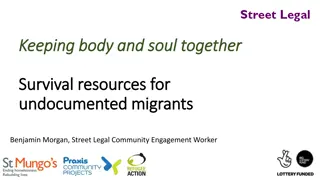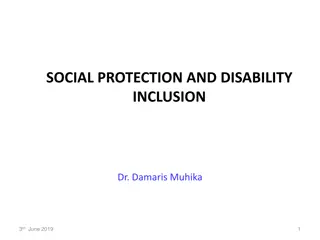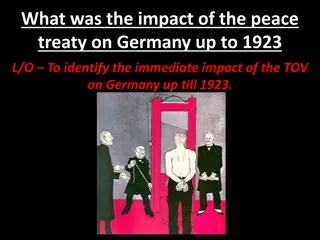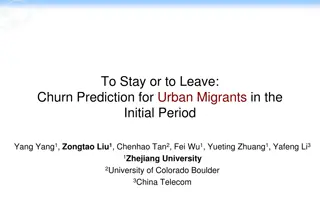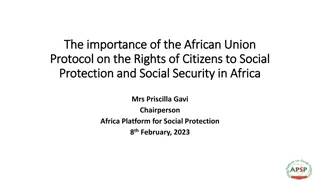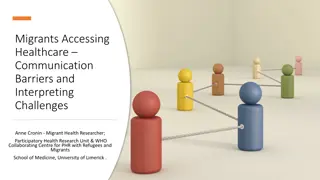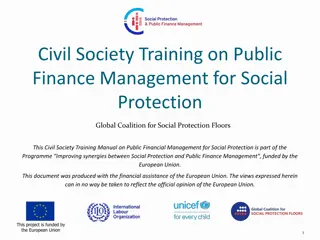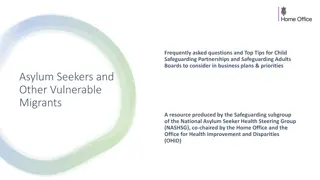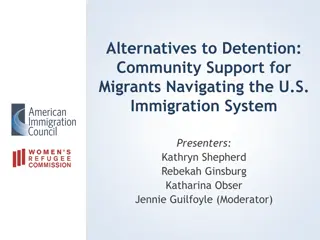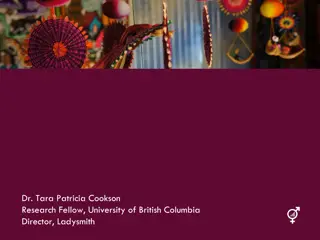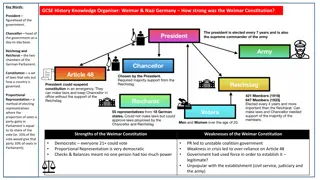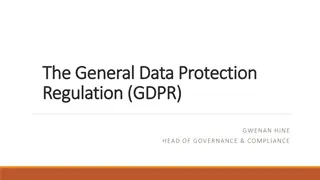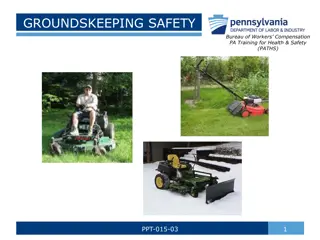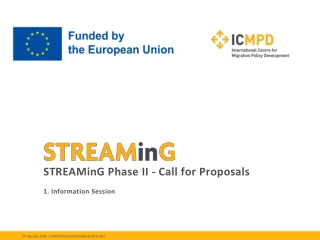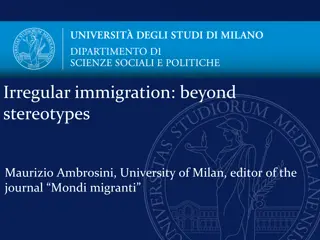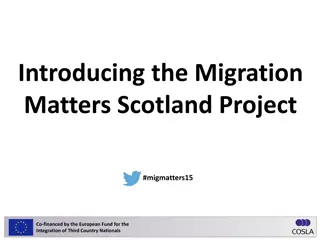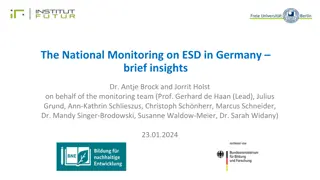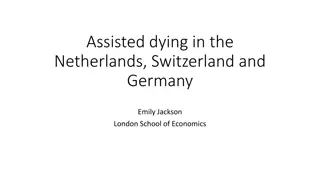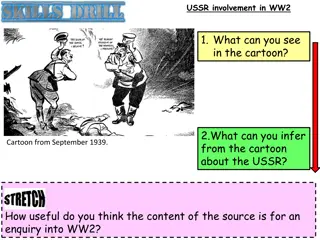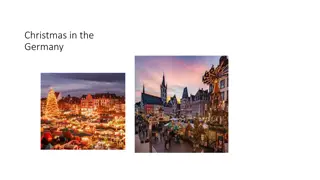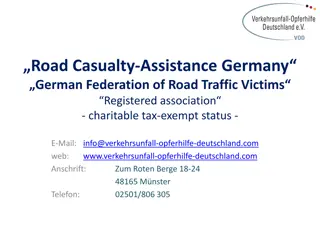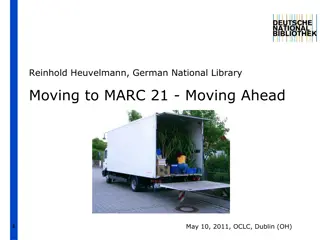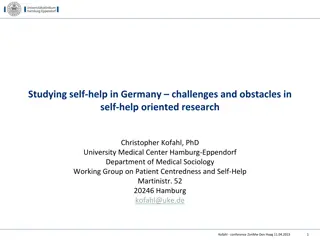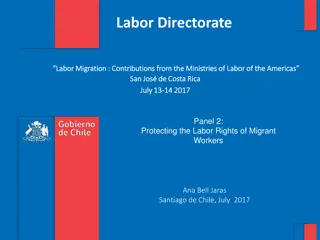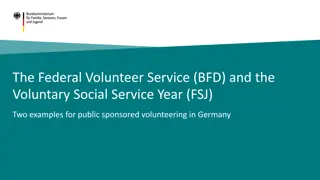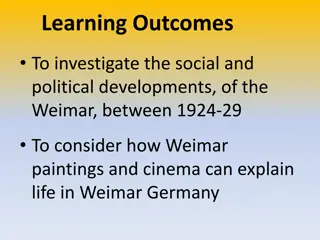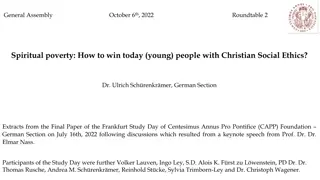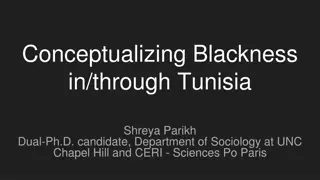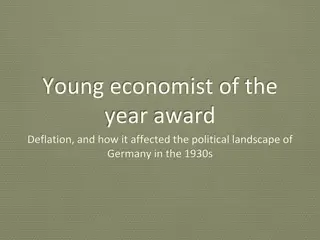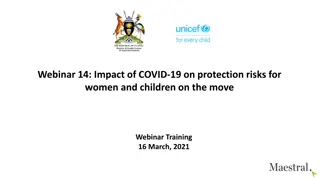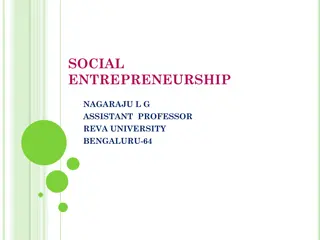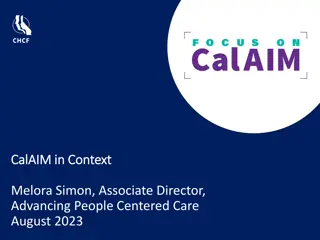Challenges Faced by Romanian Migrants Accessing Social Protection in Germany
The case study focuses on the struggles of Romanian migrants in Germany to access social benefits due to language barriers, legal complexities, and the involvement of welfare brokers. These brokers act as intermediaries but can also present challenges, including the risk of invalidating benefit claims. The study explores the role of different entities such as recruitment agencies, employers, and fiscal institutions in facilitating or hindering migrant access to social protection.
Download Presentation

Please find below an Image/Link to download the presentation.
The content on the website is provided AS IS for your information and personal use only. It may not be sold, licensed, or shared on other websites without obtaining consent from the author. Download presentation by click this link. If you encounter any issues during the download, it is possible that the publisher has removed the file from their server.
E N D
Presentation Transcript
Welfare Brokers and Mobile EU citizens Access to Social Protection: The Case of Romanian Migrants in Germany Alexandra Voivozeanu
Context I didn t know anything about child benefits [in Germany]... We don t know the language and we don t know the law I heard that [the companies] work together with lawyers. We don t know anyone. There are many obstacles for us (Maria, seasonal worker) You need about 10, up to 15 documents, per file [to] get child allowance [ ] You have three different legal basis on which you can get child allowance [ ] If you use the wrong one, you [could] cancel your complete claim Normally, the people should have fair possibility to get these social benefits, but I don t think they have (Kim, representative of a transnational company)
Context Sub-brokers in RO (recruitment agencies, transportation companies, freelancers) German employers Family Welfare Office Transnational companies (Short-term) Migrants Fiscal institutions in RO Fiscal institutions in DE There are different entities. There is the client, there are the institutions around them in Romania, there are institutions in Germany, there is the employer in Germany and, then, there is us. And we connect all these entities. (Kim, representative of transnational company)
Theoretical framework Migration-social protection nexus non-profits as rights intermediaries : provide support for EU migrants at an individual level and push for better EU law implementation (Bruzelius 2020). welfare mediators : negotiate knowledge asymmetries between street-level bureaucrats and migrants (Ratzmann and Heindlmaier, 2022). Social policy research role of voluntary and public sector brokers increase benefit uptake/ particularly relevant for vulnerable groups (Finn and Goodship 2014, Wigan and Talbot 2006, Wilson and Amir 2008) strategies of take-up agents : knowledge, networking, emotions and power (Holler and Benish 2020). Research on brokers in facilitating labour migration/development aid/media actively contribute to implementing development aid projects by translate meaning into different institutional languages of its stakeholder supporters and constantly created interest and making it real (Moses 2005) moral ambiguity and contradictions / producers of the society in which they re-emerge (James, 2011) discourses which demonize brokers draw attention from regulations, institutions and employers who are equally responsible for migrants exploitation (McKeown 2012) blurred distinctions between formal/informal, regular/irregular, state/market brokerage (Lindquist, Xiang and Yeon 2012)
Methods and data Unemployment and child benefits Online ethnographies Multi-sited ethnographies (online & in-person): 20 interviews with migrants 25 interviews with welfare brokers: informal brokers (1), ethnic associations (3), advisory offices (9) unions (2) small-scale companies(3), large-scale companies (3)& sub-brokers (1) national and local Family Benefit Office Representatives (2) Documentary research
Conceptualizing welfare brokers Welfare brokers mediators motivated by either economic gain, symbolic capital or altruism who use their expertise in the area of cross-border social protection to address knowledge gaps between civil servants and migrants and whose intervention enables the latter to access a specific benefit. Social Welfare Brokers EU Migrants administrators Employers, Tax offices, Schools, City hall etc
Knowledge gaps: EU migrants EU migrants lack knowledge of German language, of their social rights and of the institutional framework in Germany I: What did you know about [your social rights in Germany]? R: I knew nothing. I didn t expect to end up in an extreme situation. I didn t expect that I will You feel lost in a system that you are not familiar [have to] apply for benefits. In my opinion this with. So, I was not familiar with the system, I was something I would be entitled to after encountered problems, sometimes I understood years and years [in Germany]. (Ada, 32) things too late. Honestly, even if you speak the language to a certain extent, the bureaucracy is something else. (Diana, 37)
Knowledge gaps: civil servants Insufficient knowledge of EU regulations & discriminatory practices at the administrative level The law has changed so often in the last 10-15 years that in many cases employees [of Jobcenters] do not know [what is needed]. They when claiming child benefits as a Now, make a lot of mistakes: they ask for the Romanian, one will receive a long list of Freiz gigkeitsbescheinigung [freedom of documents to send additionally: a proof that your movement certificate], [ ] for an insurance child attends Kindergarden, which is not (Adrian, CSO representative) mandatory in Germany, [a rental contract], you need to mention your electricity provider, you need to prove that you paid the Radio-TV tax and many more an entire list that has nothing to do with child benefits. (Sara, CSO representative).
Knowledge gaps: civil servants Insufficient knowledge of EU regulations & discriminatory practices at the administrative level A women [ ] refused [the extension of my social [The Job Center] works based on the housing benefit] [ ] and told me: go back to your country, to Romania , and she did this gesture with her law, but in fact all that matters is hand and rejected me. I got angry and told her: you are unwritten. Your behavior, your racist. I started crying . (Irina, 32) appearance, what you are dressed like, punctuality, all this matters. Sometimes much more than that, you [as a broker] must give [civil servants] the feeling that they are not alone, that you understand them, that they have so much to do and that the cases are so difficult (Sara, CSO representative)
Knowledge gaps: civil servants Insufficient knowledge of EU regulations & discriminatory practices at the administrative level Especially in the case of child benefits, people from Romania experience very long waiting times and, occasionally, face high hurdles in submitting and having their applications processed. I would go so far as to say that systematic obstruction takes place. (Dan, CSO representative) Within a very normal child benefit case a letter arrives suddenly: the Family Welfare Office must check if one is still entitled to child benefits. And this is simply an administrative process that comes from mistrust they want to check if the people are indeed in Berlin, or if the children are indeed in Berlin, or if the conditions are still them same our white German-speaking clients never get such letters.
Welfare brokers beyond their role as mediators WB try to push for change in the normative and bureaucratic setting Yes, we are going against this law [that shortens the back payment for child benefits from four year to six months], using [this client s] case as an example we do that on a pro-bono basis, because [it is of interest] for us, of course, because we could close a lot of cases and get more money but, on the other hand, I think it is also a social point that is really important for me. (Kim, representative of transnational company).
Welfare brokers (ideal types) Transnational company Sporadic or sustained Civil society Organization (CSO) Sporadic or sustained Ethnic broker Sporadic or Time (Duration of the sustained MS where the interaction with client) Space (location(s) where the Multiple Member States (MS) MS where the benefit is claimed benefit is broker is active) claimed Profit/Social Profit Altruistic (social justice, change Motive (Gain to be expected legislation) Long-term migrants capital Long-term from the broker) Clients Short-term/seasonal migrants migrants
Migrants recourse to welfare brokers Low skilled/low paid migrants more inclined to ask for support from welfare brokers, highly paid/higher paid but also pushes higher skilled migrants to make use of welfare brokers services out of convenience. Following interaction with WB, some EU migrants become empowered in claiming their welfare rights in Germany Others still encounter consistent difficulties in acquiring information about their welfare rights [I know] 10 percent more [about the welfare [they asked us what benefits we applied for] and system in Germany]. I don t know much about it. they explain very well that we were refused in place A Because I didn t do those things myself, someone because we did not apply in place B. Then, we more or less got how this works and we learned where to else did it for me. I was just the post for those impose ourselves and so on (Laura, 3.12.2020, forms I would just submit and receive it, nothing online). else (Irina, 32)
Conclusion Role of brokerage beyond migration facilitation/arrival in the host-country. WB as mediators between the interest of all actors involved in the claim-making process- Explored the roles and practices of a diversity of actors shows that WB actively shape policies and administrative practices. Exchanges between WB and beneficiaries vary in terms of frequencies of interactions, space in which intervention is required and motives pursued by brokers. Precarious migrants more inclined to ask for support from WB but complexity also pushes higher skilled migrants to make use of welfare brokers services out of convenience. Some EU migrants become autonomous in claiming social benefits, while others become captive clients of welfare brokers and possibly a sustained source of financial gain for these actors.
